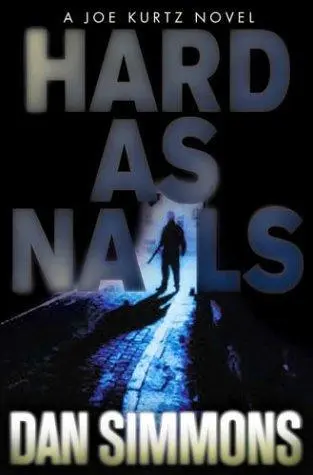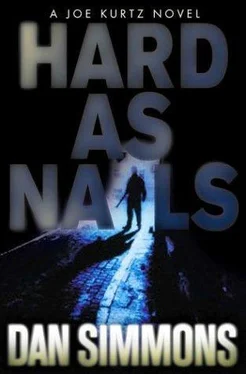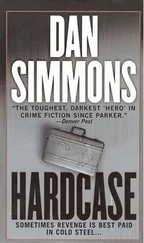
HARD AS NAILS
A JOE KURTZ NOVEL
DAN SIMMONS
"Hard," replied the Dodger.
"As nails," added Charley Bates.
— Oliver Twist by Charles Dickens
On the day he was shot in the head, things were going strangely well for Joe Kurtz. In fact, things had been going strangely well for weeks. Later, he told himself that he should have known that the universe was getting ready to readjust its balance of pain at his expense.
And at much greater expense to the woman who was standing next to him when the shots were fired.
He had a two P.M. appointment with his parole officer and he was there at the Civic Center on time. Because curb parking around the courthouse was almost impossible at that time of day, Kurtz used the parking garage under the combined civic, justice, and family court complex. The best thing about his parole officer was that she validated.
Actually, Kurtz realized, that wasn't the best thing about her at all. Probation Officer Margaret «Peg» O'Toole, formerly of the Buffalo P.D. narcotics and vice squad, had treated him decently, knew and liked his secretary—Arlene DeMarco—and had once helped Kurtz out of a deep hole when an overzealous detective had tried to send him back to County lock-up on a trumped-up weapons charge. Joe Kurtz had made more than a few enemies during his eleven and a half years serving time for manslaughter in Attica, and odds were poor that he'd last long in general population, even in County. In addition to validating his parking stubs, Peg O'Toole had probably saved his life.
She was waiting for him when he knocked on the door and entered her second-floor office. Come to think of it, O'Toole had never kept him waiting. While many parole officers worked out of cubicles, O'Toole had earned herself a real office with windows overlooking the Erie County Holding Center on Church Street. Kurtz figured that on a clear day she could watch the winos being dragged into the drunk tank.
"Mr. Kurtz." She gestured him to his usual chair.
"Agent O'Toole." He took his usual chair.
"We have an important date coming up, Mr. Kurtz," said O'Toole, looking at him and then down at his folder.
Kurtz nodded. In a few weeks it would be one year since he left Attica and reported to his parole officer. Since there had been no real problems—or at least none she or the cops had heard about—he should be visiting her once a month soon, rather than weekly. Now she asked her usual questions and Kurtz gave his usual answers.
Peg O'Toole was an attractive woman in her late thirties—overweight by current standards of perfection but all the more attractive in Kurtz's eyes for that, with long, auburn hair, green eyes, a taste for expensive but conservative clothing, and a Sig Pro 9mm semiautomatic pistol in her purse. Kurtz knew the make because he'd seen the weapon.
He liked O'Toole—and not just for helping him out of the frame-up a year ago this coming November—but also because she was as no-nonsense and non-condescending as a parole officer can be with a "client." He'd never had an erotic thought about her, but that wasn't her fault. There was just something about the act of imagining an ex-police officer with her clothes off that worked on Kurtz like a 1,000-cc dose of anti-Viagra.
"Are you still working with Mrs. DeMarco on the SweetheartSearch-dot-com business?" asked O'Toole. As a felon, Kurtz couldn't be licensed by the state of New York for his former job—P.I. — but he could operate this business of finding old high school flames, first via the Internet—that was his secretary Arlene's part of it—then by a bit of elementary skip-tracing. That was Kurtz's part of it.
"I tracked down a former high school football captain this morning in North Tonawanda," said Kurtz, "to hand him a handwritten letter from his former cheerleader girlfriend."
O'Toole looked up from her notes and removed her tortoiseshell glasses. "Did the football hero still look like a football hero?" she asked, showing only the faintest trace of a smile.
"They were both from Kenmore West's Class of 61," said Kurtz. "The guy was fat, bald, and lived in a trailer that's seen better days. It had a Confederate flag hung on the side of it and a clapped-out 72 Camaro parked outside."
O'Toole winced. "How about the cheerleader?"
Kurtz shrugged. "If there was a photo, it was in the sealed letter. But I can guess."
"Let's not," said O'Toole. She put her glasses back on and glanced back at her form. "How is the WeddingBells-dot-com business going?"
"Slowly," said Kurtz. "Arlene has the whole Internet thing set up—all the contacts and contracts with dressmakers, cardmakers, cakemakers, musicians, churches and reception halls set in place—and money's coming in, but I'm not sure how much. I really don't have much to do with that side of the business."
"But you're an investor and co-owner?" said the parole officer. There was no hint of sarcasm in her voice.
"Sort of," said Kurtz. He knew that O'Toole had seen the articles of incorporation during a visit the parole officer had made to their new office in June. "I roll over some of my income from SweetheartSearch back into WeddingBells and get a cut in return." Kurtz paused. He wondered how the felons and shankmeisters and Aryan Brotherhood boys in the exercise yard at Attica would react if they heard him say that. The D-Block Mosque guys would probably drop the price on his head from $15,000 to $10,000 out of sheer contempt.
O'Toole took off her glasses again. "I've been thinking of using Mrs. DeMarco's services."
Kurtz had to blink at that. "For WeddingBells? To set up all the details of a wedding online?"
"Yes."
"Ten percent discount to personal acquaintances," said Kurtz. "I mean, you've met Arlene."
"I know what you meant, Mr. Kurtz." O'Toole put her glasses back on. "You still have a room at… what is the hotel's name? Harbor Inn?"
"Yes." Kurtz's old flophouse hotel, the Royal Delaware Arms near downtown, had been shut down in July by the city inspectors. Only the bar of the huge old building remained open and the word was that the only customers there were the rats. Kurtz needed an address for the parole board, and the Harbor Inn served as one. He hadn't gotten around to telling O'Toole that the little hotel on the south side was actually boarded up and abandoned or that he'd leased the entire building for less than the price of his room at the old Delaware Arms.
"It's at the intersection of Ohio and Chicago Streets?"
"Right."
"I'd like to drop by and just look at it next week if you don't mind," said the parole officer. "Just to verify your address."
Shit , he thought. "Sure," he said.
O'Toole sat back and Kurtz thought that the short interview was over. The meetings had been getting more and more pro forma in recent months. He wondered if Officer O'Toole was becoming more laid back after the hot summer just past and with the pleasant autumn just winding down—the leaves on the only tree visible outside her window were a brilliant orange but ready to blow off.
"You seem to have recovered completely from your automobile accident last winter," said the parole officer. "I haven't seen even a hint of a limp the last few visits."
"Yeah, pretty much full recovery," said Kurtz. His "automobile accident" the previous February had included being knifed, thrown out of a third story window, and crashing through a plaster portico at the old Buffalo train station, but he hadn't seen any pressing need for the probation office to know the details. The cover story had been a pain for Kurtz, since he'd had to sell his perfectly good twelve-year-old Volvo—he could hardly be seen driving around in the car he was supposed to have wrecked up on a lonely stretch of winter highway—and now he was driving a much older red Pinto. He missed the Volvo.
Читать дальше













